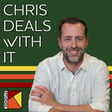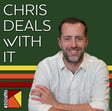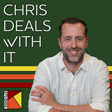Become a Creator today!Start creating today - Share your story with the world!
Start for free
00:00:00
00:00:01

EP 56 - On Birthday Systems and Our Loneliness Epidemic
On today’s episode, I explore my birthday & anniversary reminder system. Why I created it, the nuts & bolts of how it works, and the benefits it has for our relationships, soft ties, and society on a larger scale.
For more info and to download a free PDF of today's episode notes, visit: www.chriskreuter.com/CDWI
Join the Kreuter Studios mailing list: https://mailchi.mp/810367311f3d/ksbulletin
Recommended
Transcript
Overcoming Challenges with Frameworks
00:00:08
Speaker
On Chris deals with it, I talk about the frameworks and methods I use to clear personal, creative, and professional roadblocks. My goal is to help others bridge the gap between where they're at now and what they want to achieve. If you're new to the show, I'm an engineer, writer, parent, game designer, leader, and reader who leverages that experience to develop creative solutions to problems. An AI statement that all elements of this episode are products of the author, Chris Croyder, and made without the use of any AI tools.
Birthday Systems and Loneliness
00:00:39
Speaker
Welcome to episode 56 of Chris deals with it on birthday systems and our loneliness epidemic. So on today's episode, I'm going to explore my birthday and anniversary reminder system, why I created it, the nuts and bolts of how it works and the benefits it has for our relationships, soft ties and society on a larger scale.
00:00:57
Speaker
So start with the why. A few years ago, I realized that the number of friends, both old and new, former colleagues, acquaintances, were really exceeding my ability to keep track of them all. There's many who talk of the approximately 100 to 150 person limit of close contacts that a human can reliably maintain. While I'm not overly concerned by that number, there did seem to be a kernel of truth to it. Yet the answer couldn't be to say no room at the inn and drop off contact with people.
00:01:25
Speaker
I wanted something that would help me respect the past history of connection and events that form these relationships. Something that would allow me to, at the very least, keep a link to these people, even if time, distance or situations caused our path to drift further apart. So this is the why behind my system.
The Failed Database Attempt
00:01:45
Speaker
So the how, my first attempt was an expansive database, names, contact information, connections, history, favorite sports teams, pets, birthdays, anniversaries, you name it. And from this, I developed a coding system to denote how often I should keep in touch from the most often the closest people to every year or two distant acquaintances.
00:02:05
Speaker
I'd set up an email automation for the start of each week which would remind me of who was next up on my list to reach out, the theory being that I'd work my way through the list each week, update the database, and presto a contact system. Here's the thing, it didn't work. Or rather, it was too much work. Maintaining the database, forcing calls at awkward times, the coding system. It just got to be too much, and within two months I had to abandon the outreach system entirely.
00:02:31
Speaker
Yet this desire to keep in touch still remained, so I went back to the drawing board.
Google Calendar for Birthdays
00:02:36
Speaker
So let's get into the how that works, at least for me. I learned two things from that initial experiment. One, simplicity. I needed something that was both lightweight to manage and straightforward to execute. And two, timing. I would feel less resistance to reaching out if I knew who I was reaching out to wouldn't be getting the message out of the blue.
00:02:56
Speaker
In terms of timing, the birthday message was the best and most obvious. After that were wedding anniversaries or major life events. So on those dates, people tend to be more open to messages. It's a great time to reach out, check in, wish them well, say hi.
00:03:11
Speaker
This doesn't mean I wait a year to reach out to people. There are still family members and close friends that I speak to regularly if I don't see them regularly. But I decided not to build any fixed system for this, as not all aspects of any relationship can be systematized anyway. So why add pressure to something I know I'm likely to do when I can anyway? As for the system, I kept it simple, a Google Calendar.
00:03:33
Speaker
Within your account, you can create multiple calendars. Each calendar has its own set of options, which includes color coding, privacy settings, notification reminders, integrations, time zones, recurring events, which is useful for birthdays and anniversaries, and on and off visibility on your calendar views. So when I post something to my birthdays and anniversary calendar, it's added as an all day event with an annual recurrence.
00:03:58
Speaker
It is worth a quick aside here to mention that there was a significant chunk of time at the very start to set up this calendar and populate it with all the known birthdays and events that I had. I started with dates from the previous database, but I had never fully populated known dates for people.
00:04:13
Speaker
I'm going to credit Facebook for the assist here of all things. I mean, while I'm rarely active on the platform, I do maintain my account. And there's a page you can navigate to that will list out birthdays for all of your friends and contacts on there, as long as they've entered the date in their profile and shared them with friends. Turns out many do this. So provided me with a ton of dates to add into my system.
00:04:33
Speaker
But I do keep a very organized calendar as part of my yearly, quarterly, weekly, daily time management system, which I did talk about in some detail back on episode 13. And there's a link to that in the show
Integration with Notion
00:04:44
Speaker
notes. Since my calendar is front and center on a regular basis, this means I'm regularly reminded to reach out on birthdays and anniversaries.
00:04:51
Speaker
This system's easy to maintain since once I add an important date for someone or myself and I've set it to repeat, there's no more work I need to do. I don't even need to enable notifications or alerts because I'm confident I'm gonna see the information when it's timely. And this is worth another quick aside to shout out Notion's new calendar tool. I have been a huge fan of Notion for many years and it's come up many times on this podcast. It's central to how I manage my life and their new calendar tool has quickly become my go-to.
00:05:20
Speaker
It's still early days and has a few kinks to work out, but it features some robust integrations with Google Calendar, a user-friendly interface, and thankfully dark mode, which brings me to the most important part of any system actually executing on the action.
Personal Touch in Contacting
00:05:33
Speaker
My mode of interaction really depends on my proximity to the person, the timing of when I can reach out, especially during a workday, time zone differences, and my available contact information for the person.
00:05:44
Speaker
My preference ranking for contact with people would be in person, phone call, text message, email, Facebook message, another of those rare situations that prompt me to log in. And lastly would be LinkedIn, which I might use for a former colleague or a weak business tie.
00:06:01
Speaker
And something I'd like to add to the list this year, taking the time to write physical letters. In part because I love the tactile feeling of handwriting, but also it's an opportunity to connect off screen. I envision the recipient reading it over a cup of tea or coffee sitting on a couch. You know, I can enclose photos, a sticker, or some silly memento. Consider how many unexpected letters from friends you've received lately. I like the idea of going old school a bit, so I'm going to try it.
00:06:26
Speaker
Finally, maintaining this system is a breeze.
Benefits of the Reminder System
00:06:29
Speaker
All you gotta do is add in a new event. I might realize I missed someone's birthday. I'll go back and add it in, never missing it again. Early on, there were a few dates that I had wrong and when I corrected them, it would only take seconds and it's never wrong again.
00:06:43
Speaker
So the benefits of this system. It's important to keep up with your network. I'm not saying grand overtures to every small acquaintance you've ever had, but say hi, check in, keep in touch. People like to know their thought of. How many people get mad when they're being wished a happy birthday? And when life does throw you a curveball and you need that network, it's more likely to work to your benefit if you've kept it well maintained.
00:07:04
Speaker
It also helps me maintain people's contact information. People move, they change jobs, their family situations change. And I don't keep score with this back and forth communication. Keeping up expectations that those I reach out to during the year are going to return the favor. People have a lot going on in their lives. I don't mind being the one in the relationship who keeps in touch.
00:07:25
Speaker
And there's no doubt our society is suffering from an epidemic of loneliness. There is a 2023 advisory from the U.S. Public Health Service, again, link in the show notes, which contains a far deeper scientific analysis of the problems and the many health effects of positive and negative social interaction. While this topic is too much for this episode, it's important to note how even a simple system like this can help be part of alleviating some of this loneliness.
00:07:51
Speaker
You know, when something reminds me of someone, I'll ping them with a quick message just to reminisce. Many times that happy birthday message will result in a scheduled meetup, phone, or Zoom call, or a back and forth exchange. Truly catching up, at least at some level, both of you feeling more seen and reconfirming the connection.
00:08:08
Speaker
Many times those memories and reflective conversations help our own memory, recalling memorable moments, which can be its own joy.
Insights from Birthday Clusters
00:08:16
Speaker
I've also found this system provides some interesting insights. I've got close friends that share a birthday, or there's clusters out them like mid-November, which is about nine months after Valentine's Day. On a professional level, through keeping in touch, I feel more connected to industry trends, the job market, and even second and third level connections.
00:08:33
Speaker
In an era with seemingly endless tools of connection, why are we the loneliest we've ever been? Because convenience and speed often strip away depth, context, and our bandwidth. Which is why whenever the opportunity presents itself, I'm going to do what I can to move communication with someone up a level of immediacy. Face to face is better than video calls, is better than a phone call, is better than an email, is better than a text, is better than a social media DM.
The Importance of Deep Connections
00:08:59
Speaker
So let's slow down, take more time for each other, and celebrate together.
00:09:04
Speaker
I'm going to end the episode with a quote that's on page 4 of that 2023 advisory, which is courtesy of the Surgeon General of the United States, Dr. Vivek H. Murthy. I do have to shout out the recent edition of John Acuff's amazing email newsletter for bringing it to my attention and sparking the idea for this episode.
00:09:22
Speaker
Given the profound consequences of loneliness and isolation, we have an opportunity and an obligation to make the same investments in addressing social connection that we have made in addressing tobacco use, obesity, and the addiction crisis. And with that, have a great day.
Closing and Call for Support
00:09:46
Speaker
If you feel that Chris dealt with it, I'd appreciate your support of the show by sharing it with someone who might benefit. Ratings on your favorite podcast player are also helpful in growing the audience. Visit chriscroiter.com for free downloadable PDFs with notes and resources from today's episode, sign up for the CDWY mailing list, or to send in your problems or requests for future shows. That's C-H-R-I-S-K-R-E-U-T-E-R.com, or use the link in the show notes.


